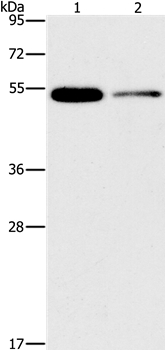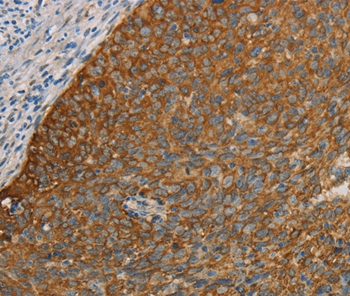

| WB | 咨询技术 | Human,Mouse,Rat |
| IF | 咨询技术 | Human,Mouse,Rat |
| IHC | 1/50-1/200 | Human,Mouse,Rat |
| ICC | 技术咨询 | Human,Mouse,Rat |
| FCM | 咨询技术 | Human,Mouse,Rat |
| Elisa | 咨询技术 | Human,Mouse,Rat |
| Aliases | FKHL6; FREAC2; FREAC-2 |
| Entrez GeneID | 2295; |
| WB Predicted band size | 46kDa |
| Host/Isotype | Rabbit IgG |
| Antibody Type | Primary antibody |
| Storage | Store at 4°C short term. Aliquot and store at -20°C long term. Avoid freeze/thaw cycles. |
| Species Reactivity | Human,Mouse |
| Immunogen | Synthetic peptide corresponding to residues near the C terminal of human forkhead box F2 |
| Formulation | Purified antibody in PBS with 0.05% sodium azide. |
+ +
以下是3篇关于FOXF2抗体的参考文献及其摘要概述:
---
1. **"FOXF2 inhibits epithelial-mesenchymal transition in non-small cell lung cancer"**
*Authors: Zhang Y, et al.*
摘要:该研究利用FOXF2抗体通过Western blot和免疫组化分析,发现FOXF2通过调控TGF-β信号通路抑制肺癌细胞的转移,提示其作为肿瘤抑制因子的潜在作用。
---
2. **"Role of FOXF2 in colorectal cancer progression and angiogenesis"**
*Authors: Chen L, et al.*
摘要:通过FOXF2特异性抗体的免疫荧光染色和ChIP实验,研究发现FOXF2通过抑制VEGF表达抑制结直肠癌血管生成,低表达FOXF2与患者不良预后相关。
---
3. **"FOXF2 regulates extracellular matrix remodeling in fibrosis"**
*Authors: Smith KA, et al.*
摘要:利用FOXF2抗体在小鼠模型中验证其蛋白表达,发现FOXF2通过调控MMP9和胶原蛋白合成参与肺纤维化进程,为靶向治疗提供依据。
---
4. **"Epigenetic regulation of FOXF2 in breast cancer stem cells"**
*Authors: Wang H, et al.*
摘要:通过FOXF2抗体的流式细胞术分析,揭示FOXF2启动子甲基化导致其表达下调,促进乳腺癌干细胞自我更新和化疗耐药性。
---
以上文献均涉及FOXF2抗体在疾病机制研究中的应用,涵盖肿瘤、纤维化等领域。如需具体文献来源,建议通过PubMed或期刊数据库检索标题或作者以获取全文。
The FOXF2 antibody is a tool used to detect the FOXF2 protein, a member of the forkhead box (FOX) family of transcription factors. FOXF2. encoded by the *FOXF2* gene on human chromosome 6p25.3. plays critical roles in embryonic development, particularly in mesenchymal cell differentiation and organogenesis (e.g., lung, gastrointestinal, and urogenital systems). In adults, FOXF2 regulates tissue homeostasis by modulating extracellular matrix (ECM) dynamics and epithelial-mesenchymal interactions. Dysregulation of FOXF2 is implicated in fibrosis, cancer progression, and vascular disorders, where it often acts as a tumor suppressor or context-dependent modulator.
FOXF2 antibodies, typically raised in rabbits or mice, enable researchers to study its expression, localization, and function via techniques like Western blotting, immunohistochemistry (IHC), and immunofluorescence (IF). These antibodies target specific epitopes, such as the N-terminal or C-terminal domains, and their specificity is validated using knockout controls or siRNA-mediated silencing. Commercial FOXF2 antibodies vary in clonality (monoclonal/polyclonal), host species, and conjugated tags (e.g., HRP, FITC).
Research applications focus on FOXF2's role in diseases: its downregulation in cancers (e.g., breast, colorectal) correlates with metastasis, while overexpression in fibrotic tissues suggests ECM dysregulation. Studies also explore FOXF2 interactions with signaling pathways (e.g., TGF-β, Wnt) and its potential as a therapeutic target. Proper antibody validation remains essential to avoid cross-reactivity with homologous FOX proteins (e.g., FOXF1), ensuring accurate biological insights.
×